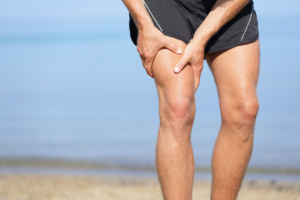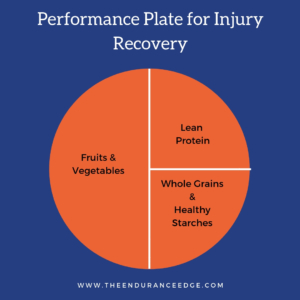Fueling to Heal an Injury
By: Sarah Heckler, MS, RD/LDN, CISSN
Let’s face it, no one plans for an injury but sometimes injuries occur. Athletes train in such a way to do everything possible to prevent an injury but even with the greatest plans, an injury can occur. When an athlete is injured his or her main focus is to recover and return to a healthy state as quickly and safely as possible. One way to do so is to alter your nutrition to aid in recovery. Our expert dietitians have put together our top rules for injury recovery nutrition.
Adjust your Performance Plate
You’ll want to adjust your performance plate as your needs/goals have changed. Prior to injury, your plate’s main job was to supply you with the energy & nutrients necessary to sustain your energy levels through training, practices and games. During an injury, you are not participating in practices and games, or not as many, and therefore, calorie needs will be deceased to account for the decrease in activity. HOWEVER, you still require energy and specific nutrients to aid in the healing process. Your injury recovery performance plate should mimic this:
Fruits and vegetables make up half the plate to ensure a high antioxidant intake to aid in healing. Focus should still be on good, quality lean protein as it is necessary to help repair tissue and minimize loss of muscle.
Focus on Nutrients that Heal
There are three main types of sports injuries; soft tissue, bone & joint injuries. Soft tissue injuries occur when there is damage to the tendon, ligament and/or muscle. Bone and joint injuries can occur from trauma or repeated stress. Therefore, the different injuries require different nutrients for healing.
Nutrients for Soft Tissue Injuries
- Nitric Oxide: important for tendons & ligaments to help stimulate collagen synthesis
- Vitamin C & Gelatin: important for tendons to promote greater collagen synthesis
- Leucine: amino acid that stimulates muscle protein synthesis
Nutrients for Joint Injuries
- Glucosamine: aids in growth and repair of connective tissue such as cartilage
- Chondroitin: component of cartilage
Nutrients for Bone Injuries
Stay Hydrated
Staying hydrated helps in facilitating the delivery of nutrients to the injured area(s). Men and women should aim to consume 3.7 and 2.7 L a day, respectively.





